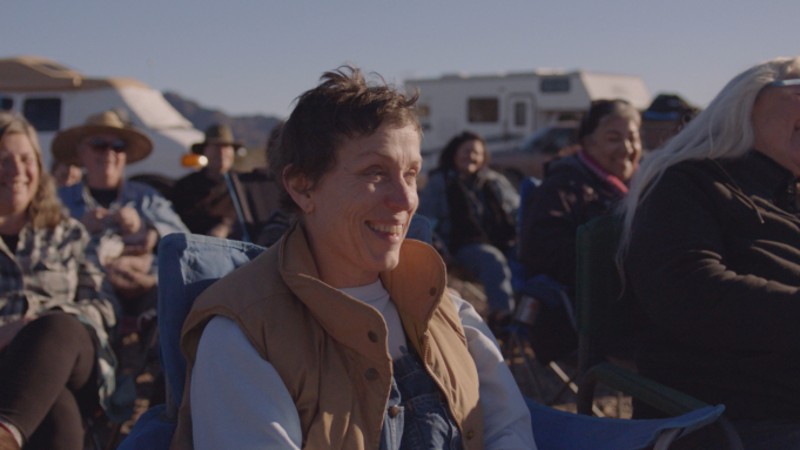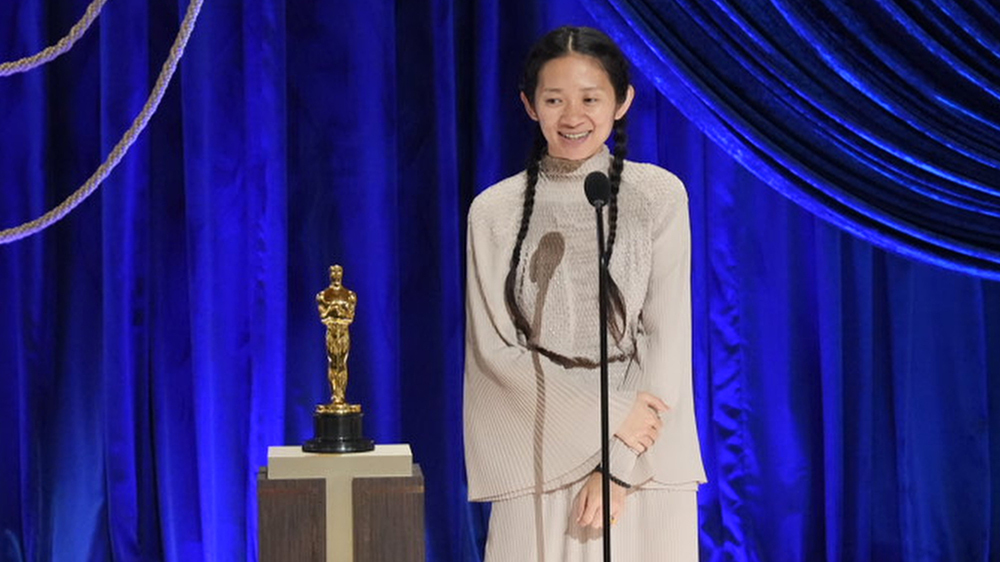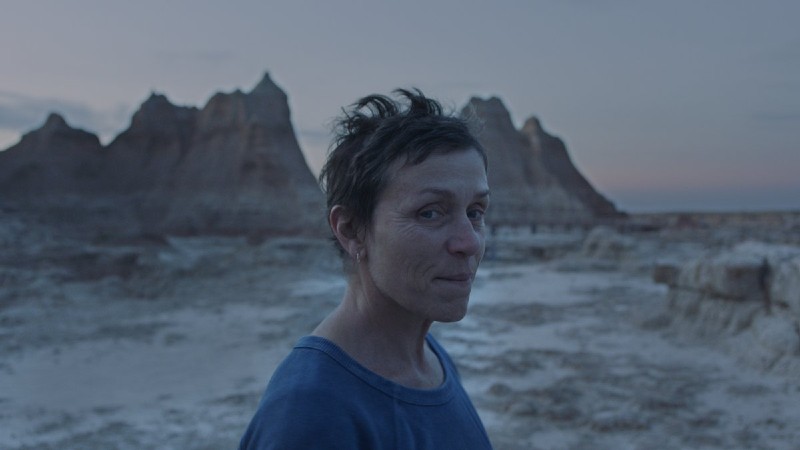Chloe Zao’s Oscar winning film Nomadland is a hybrid documentary about very many themes. That is its strength and its controversial nature. To reduce the film to one theme only, is to present it as unnecessarily reductive. Nomadland is not uncomplicated. It challenges the viewers’ expectations on every level.
First, one could certainly say that it is a piece about poverty. It features homeless people, mostly older ones, who travel around the United States in modest caravans.They have lost jobs, homes, families and when the retirement is not an option, they take to the road looking for odd jobs. Some reviewers, including our own DMovies one, see the film as an indictment against the capitalist system which strips older people of their home. It is clear that the film is that but it is not just that. It also quite curiously heralds Amazon as one of the best providers of these odd jobs. “The pay is great” say Fern. This makes all of us good left-wing intellectuals wince.
Second, the film is also about loss, the economic loss, but also about how one deals with grief, bereavement, losing the loved ones, and ultimately. with losing one’s health and yes, life.It is therefore also about how different people approach the inevitability of mortality. Some, including the main character, Fern, played by the incomparable Frances McDormand, who has won her third Oscar for the part, choose to embrace and enjoy the sense of freedom that the nomad life gives them.
Third, the film is then about an ability to find solace in most unexpected places, in nature but also in small gestures of kindness from fellow human beings. It is about an ability to take pleasure in the tiniest of moments, which one can develop and nurture. One can enjoy little events in life. It’s these small events that really matter once all material possessions have gone. But then – all of a sudden – the film contradicts itself: Fern’s male friend inadvertently breaks a plate she treasures, a souvenir from her father and so she gets very angry, and glues it together, painstakingly. This contradiction makes Nomadland so endlessly surprising and rich.
.
At the coalface
And then finally, the most surprising revelation of all is to discover that Zhao’s film – which pretends to be a mainstream offering and as such is winning mainstream awards – is, in fact, an experimental documentary: McDormand, who is also one of the producers of the film, enters the actual physical world of the nomads and interviews them for the film. McDormand and Zhao are documentary filmmakers of sorts, documenting the lives of that community with McDormand as Fern interacting with the actual people who live this way. Does this present ethical issues? Yes, of course it does, also because the film’s final message is unrepentedly optimistic.
Nomadland is not a hard–hitting piece on poverty such as, for example, Ken Loach’s I, Daniel Blake (2016). Chloe Zhao’s second film offers a different vision, that of freedom, and that vision has been criticised by some as romanticised and sentimental. Fern chooses her old caravan and roaming around the deserts and the rocks of the shores of the ocean above family ties and domestic responsibilities. There is something attractive about this escape from domesticity, but I am sure that Frances McDormand (pictured below) taking a shit in a bucket next to her kitchen utensils is anything but sentimental.

.
The voices of “the other”
Still – here the problem here is more complex as Zhao uses real people in real situations to tell an ultimately fictional story. There is an ethical problem of any (documentary) filmmaker using the voice of the other in one’s work. The celebrated American Asian filmmaker and scholar and Trinh T.Minh-ha brutally stated some 30 years ago that any situation in which one person tells stories of other lives necessarily involves an asymmetrical power relationship. She said about her own work: “A conversation of ‘us’ with ‘us’ about ‘them’ is a conversation in which ‘them’ is silenced. “
Historically, documentary filmmaking began as a colonial and deeply capitalist project carried out by white men often presenting strange people from far-flung cultures. The two fathers of the genre Robert Flaherty and John Grierson working in the ’20s and ’30s of the last century did their creative artistic work in the pay of the Shipyard Board (Grierson) and fur companies (Flaherty).Flaherty’s films, as we may recall, with the famous Nanook of the North (1922) were dramatic reconstructions and not attempts to capture the observable world. Flaherty made up scenes of “the exotic other” behaving in “authentic” ways in order to make his film more attractive and commercially viable.
It was not until Fatimah Tobing Rony’s book The Third Eye: Race, Cinema, and Ethnographic Spectacle (1996) that Nanook’s position as an anthropological document was questioned openly, despite some earlier evidence presented forcefully previously (in a another documentary film in 1984). There is still reluctance to let go of the artist/explorer myth, however false it is from a factual viewpoint, never mind any ethical discussions.The list of celebrated films made by white men about “the exotic other”is endless: there is Jean Rouch’s work for example, there have been the works of Fred Wiseman, there is much later Dennis O’Rourke’s The Good Woman of Bangkok (1991) and the more recent works including the multi-award winning The Act of Killing (Joshua Oppenheimer, 2012).
What Zhao does in Nomadland is something quite extraordinary. It is almost like she is settling the old scores. She takes the documentary artist/explorer myth and turns it upside down. Robert Flaherty in his Nanook pretends to be making a documentary but in fact makes fiction that is disrespectful to the Inuk culture and was also a complete lie: the life he presented in his film never existed and was but his fantasy. On the other hand, Zhao made a film which can be perceived as fiction but in fact relies heavily on its documentary material, techniques and structure. Her cinema is respectful and reflective and attempts to find dignity in difficult circumstances.

.
Boundless possibilities
The image of Chloe Zhao with the Oscar statuette (pictured above) should be juxtaposed with the images of the indigenous women from Nanook. What is striking that their ethnicity and looks are similar but the Nanook women hold children and food in their hands and Chloe Zhao holds the Oscar statuette, the Western world’s highest accolade for a filmmaker. We also do know now that these women were sexually exploited by Flaherty and his team, their agency as people and women nearly extinguished.
This Oscar-winning director, a non-white woman, working with another woman, who happens to be white, says something profound about these intersectional allegiances that the Audre Lourde encouraged in her ground-breaking discussion with Adrienne Rich. The film tells a story of the Western culture which has failed us. Nomadland is about the urgent need to re-think our materialistic Western aspirations, which devalue human relationships. These aspirations destroy nature – which we rely on for life itself – and offer an illusion of security and comfort but, in reality,might be taking us far away from where we need to be. But Nomadland is also more than a sum of its parts which is its undeniable strength: it is a hopeful testimony to the boundless possibilities of human spirit and human creativity, both in its narrative and in its creative provenance.









